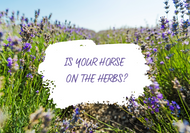Our domestic horses today live very sheltered lives, in conditions far removed from their wild ancestors. Restricted to specific pasture space and often confined in stalls for long periods they don't have the freedom to forage unfettered for the grasses and plants that fulfil their natural nutritional needs.
Even the way modern horses eat is unnatural. Although their digestive systems are designed to cater for small amounts grazed almost continuously, they are now usually fed individual periodic meals of hay and grain. Our horses are also expected to perform hard and fast at certain times, and rest up at others, according to our demands and not their whims.
It all goes to make horse nutrition a complicated science in which the feeding of numerous dietary supplements is advised for all sorts of reasons. No wonder those of us who love and care for horses become confused, especially when faced with literally thousands of commercially available equine feed supplements.
Fortunately the supplement market (both for horses and humans) is going back to nature and turning increasingly to the use of herbs. Not only simple to use and generally well accepted by horses and ponies, herbs are also economical.
The best way to source herbs for your horses is to buy dried herbs or herbal tinctures in bulk. You can, of course, grow your own or go out foraging for fresh plants, but you'll run in to problems with seasonality and being able to harvest enough.
Five Helpful Herbs and their Uses:

Yes, the ubiquitous and often annoying nettle plant is valuable as a rich source of iron, not to mention a load of other important vitamins and minerals.
Nettles have all sorts of benefits, supporting the immune, urinary, respiratory and reproductive system, as well as strengthening hooves and improving coat health.
Use commercially available dried nettles or a nettle tincture, or add half a cup of fresh nettle leaves to your horse's feed every day (after steeping in boiling water to remove the sting).

Another humble herb from the hedgerows, Dandelion is eagerly sought out by horses in the pasture, which is an indication that they not only have a taste for it, but instinctively know it is good for them. It's so good, in fact, that it
acts as a tonic, revving up all the functions - liver, bile, kidneys - that rid the body of toxins. Dandelion (packed with vitamins A, B, C and D) is thus great for improving overall condition.
If you don't have any fresh dandelions available, add a daily cup of dried dandelion leaves to your horse's feed.
Known as the healing herb, the medicinal effects of Comfrey are hailed by many as miraculous, particularly when it comes to knitting bone and repairing connective tissue or cartilage.Comfrey leaves (available dried) are usually used to promote healing in horses, by feeding orally and using as a compress. Comfrey contains allantoin, a cell proliferant; it is also the only land plant that is a source of vitamin B12, and contains a large amount of protein - some sources say the protein percentage is as high as that found in soya beans.
It's not advisable to use Comfrey on a long term basis, but just when required to treat injury.
You may enjoy eating succulent red Raspberries, but your horse - particularly if she's a moody mare - will lap up the leaves!
Raspberry leaves are high in calcium and help maintain the delicate balance between estrogen and progesterone, ensuring hormonal balance, improving the mare's temperament. Raspberry also strengthens and tones the uterus to assist with fertility and pregnancy.
Raspberry leaves contain significant amounts of antioxidants, which boost the immune system and act as an anti-
inflammatory and blood sugar regulator.
Feeding about half a cup of dried Raspberry leaf to your mare each day can also help with diarrhoea.
Chamomile is a calming herb which can be used to help horses cope with stress or duress, such as during training or preparing for competition.
The little blossoms of the chamomile plant are high in phosphorous and calcium, and strengthen and regulate the nervous system. We, as humans, also know that chamomile is a natural sedative - and it works the same with horses, reducing anxiety and hyperactivity. It's also useful for treating allergic reactions, and supports the digestive system.
Just add a half to a cupful of dried chamomile flowers to your horse's feed ration.
It's best not to use chamomile for more than a few months at a time, when required, because long-term use can be toxic to the liver.
TotallyTack has a vast range of 100% natural herbal supplements available from tried and trusted major suppliers such as Hilton Herbs and Global Herbs.






